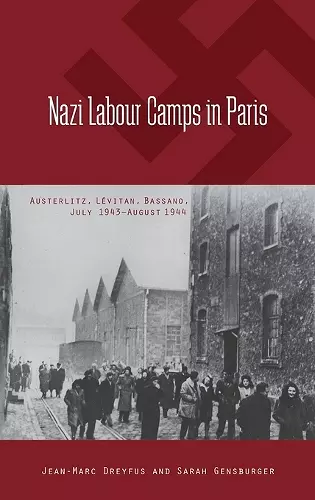Nazi Labour Camps in Paris
Austerlitz, Lévitan, Bassano, July 1943-August 1944
Jean-Marc Dreyfus author Sarah Gensburger author
Format:Hardback
Publisher:Berghahn Books
Published:1st Sep '11
Currently unavailable, and unfortunately no date known when it will be back

On 18 July 1943, one-hundred and twenty Jews were transported from the concentration camp at Drancy to the Lévitan furniture store building in the middle of Paris. These were the first detainees of three satellite camps (Lévitan, Austerlitz, Bassano) in Paris. Between July 1943 and August 1944, nearly eight hundred prisoners spent a few weeks to a year in one of these buildings, previously been used to store furniture, and were subjected to forced labor. Although the history of the persecution and deportation of France’s Jews is well known, the three Parisian satellite camps have been subjected to the silence of both memory and history. This lack of attention by the most authoritative voices on the subject can perhaps be explained by the absence of a collective memory or by the marginal status of the Parisian detainees - the spouses of Aryans, wives of prisoners of war, half-Jews. Still, the Parisian camps did, and continue to this day, lack simple and straightforward descriptions. This book is a much needed study of these camps and is witness to how, sixty years after the events, expressing this memory remains a complex, sometimes painful process, and speaking about it a struggle.
“…[an] important, …well-documented and instructive monograph.”• H-France
“In this well-written and expertly organized book, Jean-Marc Dreyfus and Sarah Gensburger skillfully chart the trajectories of three forced labor camps for Jewish prisoners in Occupied Paris… Because of the interest that it will have for scholars working on the difficulty of defining a Jew during the period of National Socialism and on memory studies, this book deserves to be read by a larger audience. Fortunately, the book’s excellent translation from the original French and its lucid and concise style makes it very readable. It will provide food for thought for the professional historian and a stimulating read for the non-specialist.”• French Politics, Culture & Society
“Full of fascinating detail and admirably connecting the story of the Paris camps to larger developments in Nazi Europe, this important book could easily gain a wide audience, including university students, because it is well organized, ably translated, and easy to read. Moreover, its core chapters take the reader smoothly from why and how the camps were established, to what life was like for the inmates, and to a final section on the dismantling of the camps and their slide into obscurity (until recently).”• The Historian
“An association of the camps’ survivors was created in the mid-1990s, after newspaper articles drew attention to the existence of a concentration camp near the site of the new French National Library. The association, whose goal is to retrace the history of these camps, invited Dreyfus and Gensburger to write an academically rigorous study. The result is a well-researched analysis that has helped bring Möbel Aktionand its labor camps into the public eye.”• German Studies Review
“Given that the Germans destroyed virtually all records of [the camps] as they withdrew, the authors have done a remarkable job reconstituting the story. They also have explained the complicated story of how the memory of these events was almost lost, ignored by historians, distorted in commemorative plaques, and inaccurately recounted in fiction. Fortunately it is now available in this sophisticated, thoughtful, and authoritative account.”• Holocaust and Genocide Studies
ISBN: 9780857451392
Dimensions: unknown
Weight: 381g
176 pages